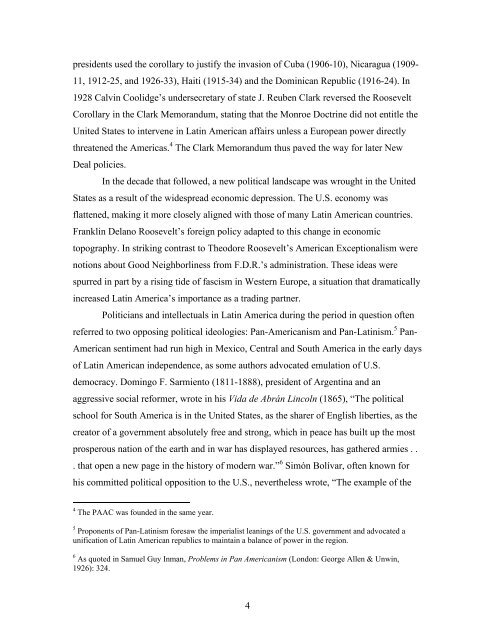Collective Difference: The Pan-American Association of Composers
Collective Difference: The Pan-American Association of Composers
Collective Difference: The Pan-American Association of Composers
You also want an ePaper? Increase the reach of your titles
YUMPU automatically turns print PDFs into web optimized ePapers that Google loves.
presidents used the corollary to justify the invasion <strong>of</strong> Cuba (1906-10), Nicaragua (1909-<br />
11, 1912-25, and 1926-33), Haiti (1915-34) and the Dominican Republic (1916-24). In<br />
1928 Calvin Coolidge’s undersecretary <strong>of</strong> state J. Reuben Clark reversed the Roosevelt<br />
Corollary in the Clark Memorandum, stating that the Monroe Doctrine did not entitle the<br />
United States to intervene in Latin <strong>American</strong> affairs unless a European power directly<br />
threatened the Americas. 4 <strong>The</strong> Clark Memorandum thus paved the way for later New<br />
Deal policies.<br />
In the decade that followed, a new political landscape was wrought in the United<br />
States as a result <strong>of</strong> the widespread economic depression. <strong>The</strong> U.S. economy was<br />
flattened, making it more closely aligned with those <strong>of</strong> many Latin <strong>American</strong> countries.<br />
Franklin Delano Roosevelt’s foreign policy adapted to this change in economic<br />
topography. In striking contrast to <strong>The</strong>odore Roosevelt’s <strong>American</strong> Exceptionalism were<br />
notions about Good Neighborliness from F.D.R.’s administration. <strong>The</strong>se ideas were<br />
spurred in part by a rising tide <strong>of</strong> fascism in Western Europe, a situation that dramatically<br />
increased Latin America’s importance as a trading partner.<br />
Politicians and intellectuals in Latin America during the period in question <strong>of</strong>ten<br />
referred to two opposing political ideologies: <strong>Pan</strong>-<strong>American</strong>ism and <strong>Pan</strong>-Latinism. 5 <strong>Pan</strong>-<br />
<strong>American</strong> sentiment had run high in Mexico, Central and South America in the early days<br />
<strong>of</strong> Latin <strong>American</strong> independence, as some authors advocated emulation <strong>of</strong> U.S.<br />
democracy. Domingo F. Sarmiento (1811-1888), president <strong>of</strong> Argentina and an<br />
aggressive social reformer, wrote in his Vida de Abrán Lincoln (1865), “<strong>The</strong> political<br />
school for South America is in the United States, as the sharer <strong>of</strong> English liberties, as the<br />
creator <strong>of</strong> a government absolutely free and strong, which in peace has built up the most<br />
prosperous nation <strong>of</strong> the earth and in war has displayed resources, has gathered armies . .<br />
. that open a new page in the history <strong>of</strong> modern war.” 6 Simón Bolívar, <strong>of</strong>ten known for<br />
his committed political opposition to the U.S., nevertheless wrote, “<strong>The</strong> example <strong>of</strong> the<br />
4 <strong>The</strong> PAAC was founded in the same year.<br />
5 Proponents <strong>of</strong> <strong>Pan</strong>-Latinism foresaw the imperialist leanings <strong>of</strong> the U.S. government and advocated a<br />
unification <strong>of</strong> Latin <strong>American</strong> republics to maintain a balance <strong>of</strong> power in the region.<br />
6 As quoted in Samuel Guy Inman, Problems in <strong>Pan</strong> <strong>American</strong>ism (London: George Allen & Unwin,<br />
1926): 324.<br />
4
















